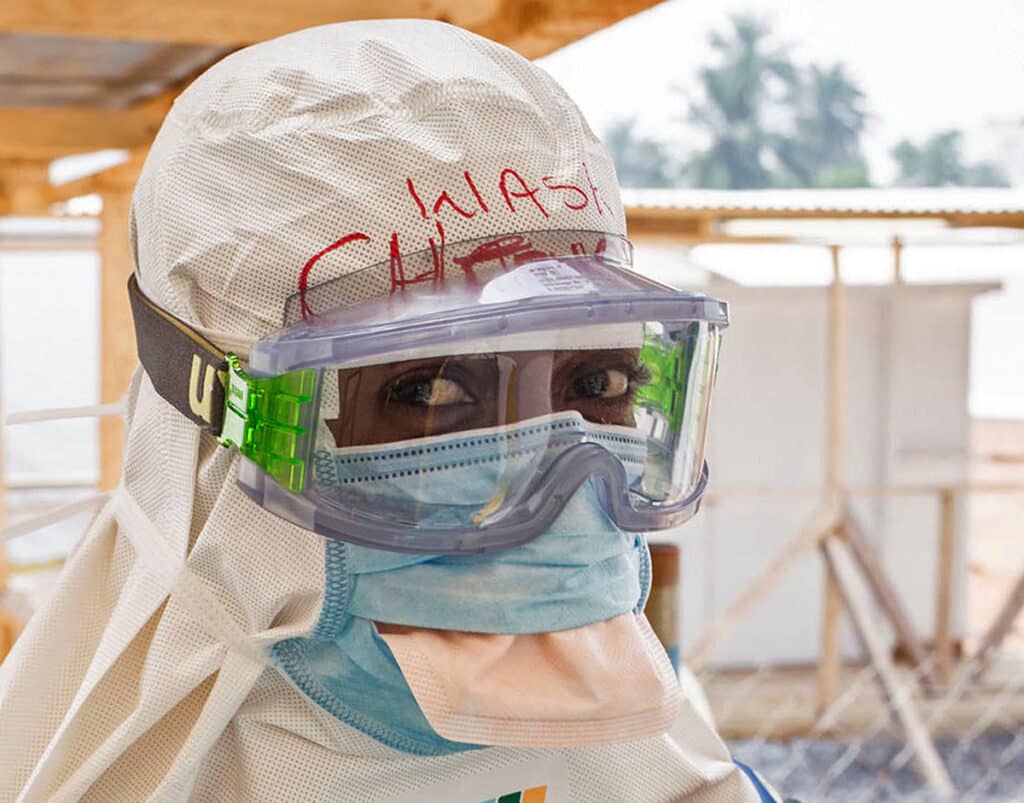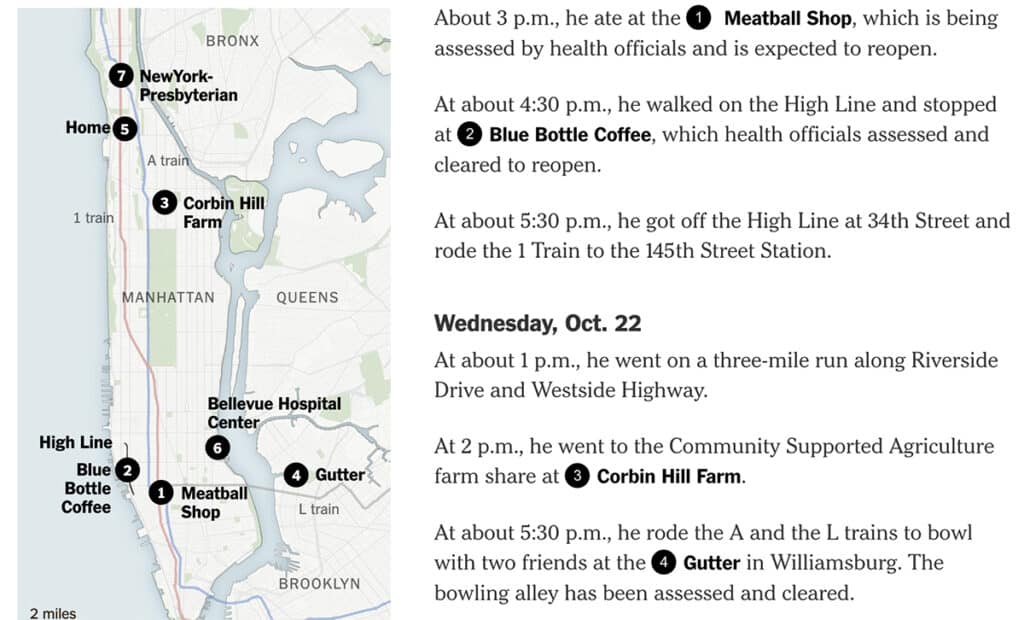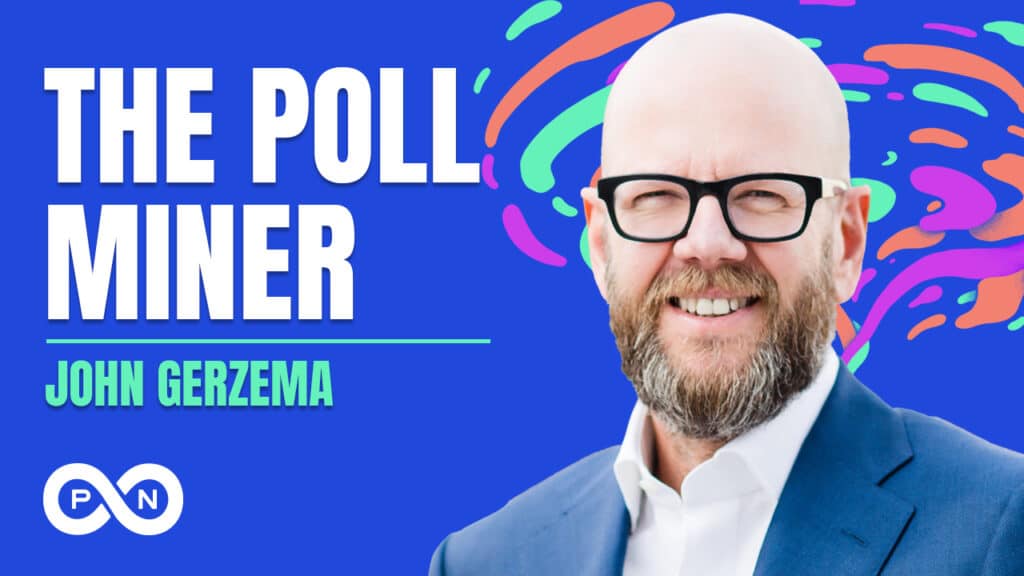Volcanoes are erupting in The Philippines, but on-fire Australia received some welcome rain. The Iran war cries have been called off and The Donald’s military powers are about to be hamstrung by the Senate. Meanwhile, his impeachment trial is starting, and we’re all on Twitter for a front-row seat.
What Could Go Right? What Happened to Ebola?
There’s a reason why you haven’t heard about it in years.
This is our weekly newsletter, What Could Go Right? Sign up here to receive it in your inbox every Thursday at 5am ET. You can read past issues here.
What Happened to Ebola?

One of the difficulties of writing about what is going right is that most of what is going right is not currently in the news. When a topic is off our collective radar like that, we don’t care much about it. This is natural. But it also means that our newsletter runs the risk of landing in your inboxes with all the panache of a butter sandwich.
Unless you happen to be an infectious disease specialist, such is the case with today’s topic of Ebola—you know, the scary virus that causes Ebola virus disease, which has an exceptionally variable fatality rate, remains highly transmissible after death, and can make you bleed into your eyes and skin. It hasn’t been in the news in a decade, and for a reason.
So, before I get into it, I would like to remind us all that we used to care a lot about Ebola, because in October 2014, an Ebola outbreak in West Africa had spilled over into the United States. We cared so much that The New York Times and other outlets felt compelled to reconstruct an hour-by-hour timeline, with a corresponding map, of New York City’s first Ebola patient, a doctor who had treated patients in Guinea with the organization Doctors Without Borders.

The doctor made a full recovery, but over 11,000 people died in Guinea, Liberia, and Sierra Leone. After that outbreak ended in 2016, small ones occurred regularly elsewhere in Africa until 2018–20, when over 2,000 people in the Democratic Republic of Congo (DRC) and Uganda were killed.
Around then is when the game changed. During the 2014–16 outbreak, pharmaceutical companies began developing and trialing a world-first Ebola vaccine. In 2019, the World Health Organization (WHO) prequalified one for the first time, meaning that they were comfortable recommending its use. A second vaccine followed in 2020. By 2021, the WHO had established a stockpile that was at the ready for rapid sendout in the event of another outbreak.
Since then, however, outbreaks have been so small and so quickly contained that most of the cache, says a new report published by the Centers for Disease Control, was repurposed for preventative vaccination of healthcare and other workers on the front lines of at-risk countries. It also says that the new vaccines likely played an important role in creating this new world of limited outbreaks. Between 2021 and 2023, only 33 people died from Ebola, in the DRC and Guinea. (Small numbers also died in Uganda from Sudan ebolavirus, which is caused by a different Ebola strain and for which no vaccine exists.)
The idea that the era of large, deadly Ebola outbreaks might be behind us isn’t new—I wrote about it in this newsletter back in 2021 as well. But these are the first figures I’ve seen that could bear that theory out or disprove it. So far, so good!
If we ever do see Ebola in the US again, however, a reminder that fatality rates in a rich country like the US are much lower than ones in poorer places; a lot of it has to do with the quality of medical care. Even in places like the DRC, the risk of Ebola pales in comparison to more “pedestrian” killers like diarrhea.
What Could Go Right? S6 E6

How do we properly mine for public opinion? Can we trust polls again? And is there a “secret Biden voter” out there? Zachary and Emma speak with John Gerzema, CEO of The Harris Poll and columnist. The 2024 US presidential election, the mood of America, and major flaws of polling are discussed here today. | Listen now
By the Numbers
35: The number of countries that have legalized same-sex marriage since 2001, when the Netherlands was the first to take the plunge.
90: The percent drop in violence, burglary, and car crime in England and Wales over the past 30 years. So why do 78 percent of people there think it has gone up?
~4.5: The expected increase in global life expectancy by 2050 despite geopolitical and environmental threats, bringing it to over 78 years of age. Life expectancy will increase even more in countries with currently low life expectancies, evening out geographic disparities worldwide.
Quick Hits
💶 Inflation in the eurozone is set to drop faster than previously expected. It is cooling off in the US as well.
🇮🇳 The share of power in India produced by coal has dropped below 50 percent for the first time since the 1960s, thanks to rapid renewable energy buildout. Research suggests that India will meet its goal of 50 percent power from non-fossil fuel-backed sources well ahead of the 2030 target.
🐋 New data suggests that the population of Antarctic blue whales, reduced to mere hundreds after centuries of industrial whaling, has resurged. Researchers are tracking their numbers through the whales’ songs and calls, which they use to communicate with one another. You can even listen to what they sound like here.
📉 Fatal drug overdoses in the US dropped in 2023 for the first time in five years.
👏 Belize, Jamaica, and St. Vincent and the Grenadines have eliminated mother-to-child transmission of HIV and syphilis.
🫀 Is “digital twins healthcare” in our future? Researchers have begun building exact, personalized replicas of organs and other bodily parts to run simulations on them. These would help doctors answer questions like which drug works best and whether a surgery would be effective before making treatment decisions. (WSJ $)
🐠 Peru just christened a new reserve in an exceptional marine ecosystem off its northern coast that will protect it from mining, industrial fishing, and other threats like oil spills.
🤰 New York has become the first American state to require employers to provide paid leave for prenatal care (up to 20 hours) like doctors’ appointments and procedures. It may start a trend.
🗳️ In June, Ireland’s homeless will vote for the first time. A reform passed in 2022 allowed charities to provide them with an address so that they could register to vote.
📈 According to one set of data, the share of American workers likely on sabbatical has doubled since 2019. The trend is mostly driven by Gen Z, which has higher expectations for work-life balance than previous generations.
💊 Begone, the rapid-fire listing of drugs’ side effects at the end of a commercial—new standards for drug advertising come into effect in the US this week that include that the presentation of known risks be clearly understandable.
💡 Editor’s pick: In countries without large rates of immigration, expect the “fertility rate crisis” to become a more and more frequent topic of conversation. One Italian province has defied Italy’s overall fertility bust. Their secret? Child-friendly policies.
TPN Member Originals
(Who are our Members? Get to know them.)
- Sustainability: Suddenly the action is local. | Our Towns | Deborah Fallows
- What the right gets right | Slow Boring | Matthew Yglesias
- Practicing meaningful dialogue in a time of polarization | Tricycle | Emma Varvaloucas with John Wood, Jr.
- The bird flu | Tangle | Isaac Saul
- If GPT-4o seems like ‘Her,’ it’s a welcome upgrade over ‘The Terminator’ | Faster, Please! | James Pethokoukis
- A message for those graduating in toxic times | GZERO | Ian Bremmer
- Russian victories in Ukraine: An avoidable tragedy | Lucid | Ruth Ben-Ghiat
- An end to extreme poverty? (Or at least the extreme poverty line) | CGD | Charles Kenny
- How to be your best despite the passing years | The Atlantic ($) | Arthur C. Brooks
- The authoritarians have the momentum | NYT ($) | David Brooks
- The meaning of Caitlin Clark | WaPo ($) | Theodore R. Johnson
- Earners vs owners | No Mercy/No Malice | Scott Galloway
- Higher education needs more Socrates and Plato | NYT ($) | Ezekiel J. Emanuel
- Debating Trump is a mistake | Persuasion | John McWhorter
- How Drake became white | The Atlantic ($) | Thomas Chatterton Williams
- Legal weed is coming. It’s time to come up with some rules. | NYT ($) | Maia Szalavitz
- South Korea fertility crisis: Could public subsidies solve it? | Bloomberg ($) | Tyler Cowen



[…] Read the free article here […]